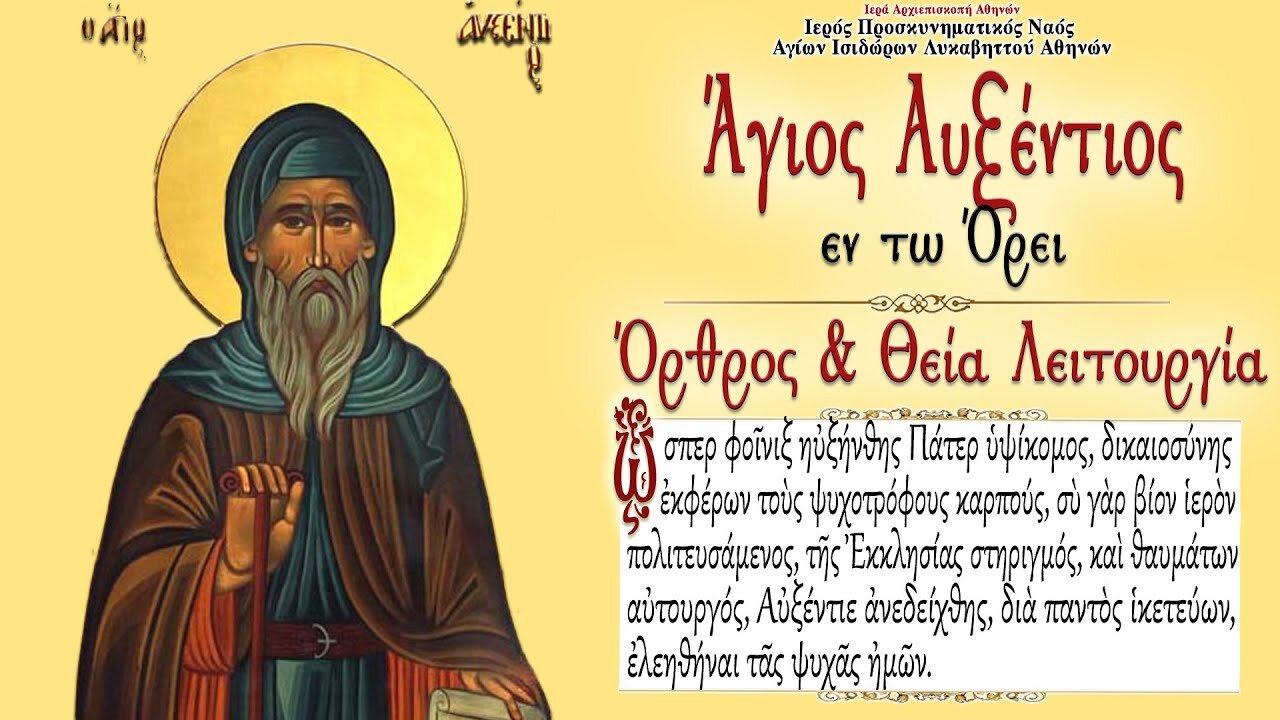Premium Only Content

February 14, 2022, Holy Father Auxentius of the Mountain | Greek Orthodox Divine Liturgy
Saint Auxentius, by origin a Syrian, served at the court of the emperor Theodosius the Younger (418-450). He was known as a virtuous, learned and wise man, and he was, moreover, a friend of many of the pious men of his era.Distressed by worldly vanity, Saint Auxentius was ordained to the holy priesthood, and then received monastic tonsure. After this he went to Bithynia and found a solitary place on Mount Oxia, not far from Chalcedon, and there he began the life of a hermit (This mountain was afterwards called Mt. Auxentius). The place of the saint’s efforts was discovered by shepherds seeking their lost sheep. They told others about him, and people began to come to him for healing. Saint Auxentius healed many of the sick and the infirm in the name of the Lord.
In the year 451 Saint Auxentius was invited to the Fourth Ecumenical Council at Chalcedon, where he denounced the Eutychian and Nestorian heresies. Familiar with Holy Scripture and learned in theology, Saint Auxentius easily bested those opponents who disputed with him. After the end of the Council, Saint Auxentius returned to his solitary cell on the mountain. With his spiritual sight he saw the repose of Saint Simeon the Stylite (459) from a great distance.Saint Auxentius died about the year 470, leaving behind him disciples and many monasteries in the region of Bithynia. He was buried in the Monastery of Saint Hypatius at Rufiananas, Syria.
Apolytikion of Auxentios of the Mountain
Thou didst prove to be a citizen of the desert, an angel in the flesh, and a wonderworker, O Auxentius, our God-bearing Father. By fasting, vigil, and prayer thou didst obtain heavenly gifts, and thou healest the sick and the souls of them that have recourse to thee with faith. Glory to Him that hath given thee strength. Glory to Him that hath crowned thee. Glory to Him that worketh healings for all through thee.
Watch live from the Greek Orthodox Church of Saint Isidoroi at Lycabettus Hill, the Matins/Orthros and the Divine Liturgy. The small church of Saint Isidoroi belongs to the Holy Archdiocese of Athens and is located on the west side of Lycabettus Hill in Athens, built inside the largest cave on the hill. According to tradition, this cave was a place of ascetic life of the Christians of the first centuries.
-
 2:27:34
2:27:34
Greek Orthodox Church St. Isidoroi, Athens, Greece
2 years agoNovember 4, 2022, St. George Karslidis the Confessor | Greek Orthodox Divine Liturgy
88 -
 15:21
15:21
Forrest Galante
17 hours agoWorld's Deadliest Predator Up Close (Private Tour)
35.2K4 -
 2:49:49
2:49:49
BlackDiamondGunsandGear
13 hours agoBDGG live with DLD After Dark
3.95K2 -
 27:43
27:43
hickok45
6 hours agoSunday Shoot-a-Round # 263
4.11K6 -
 15:17
15:17
This Bahamian Gyal
16 hours agoTHEY REALLY hate Donald and Melania Trump!
2.4K9 -
 8:37
8:37
GBGunsRumble
16 hours agoGBGuns Range Report 11JAN25
1.75K2 -
 49:15
49:15
Weberz Way
15 hours agoWILD FIRES, LAND GRAB, ARSON, SLEEPER CELLS, WHAT A MESS IN CA!
1.51K1 -
 4:13:07
4:13:07
Nobodies Gaming
14 hours ago $13.27 earnedNobodies : Rumble Gaming MARVEL RIVALS TEST
93.1K14 -
 4:15:57
4:15:57
Joker Effect
15 hours agoJoker plays... S.T.A.L.K.E.R.2: Heart of Chornobyl
138K42 -
 32:56
32:56
MYLUNCHBREAK CHANNEL PAGE
21 hours agoUnder The Necropolis - Pt 3
105K69